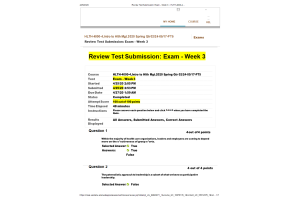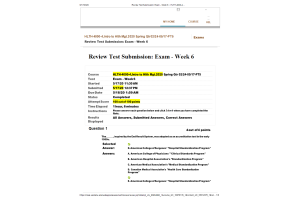HLTH 4000 Week 3 Midterm Exam (100 out of 100 Points)
- $29.00
1. Question: A culture in which the leadership style of the manager features ... culture characterized by participation
2. Question: The second strongest form of leadership is leadership by example.
3. Question: The administration of a budget is an integral part of the basic management function of coordinating.
4. Question: To encourage a service-oriented culture, effective supervisors:
5. Question: The fundamentals of consensus decision making do not include:.
6. Question: The supervisor's role in working with the budget:
7. Question: The key steps involved in addressing and solving a large problem include:
8. Question: A run chart plots data over time, exhibiting trends, cycles, or other patterns in a process.
9. Question: The acronym FACHE stands for:
10. Question: A structured brainstorming will frequently include:
11. Question: The strength of the group dynamics ... authority, responsibility, information, and resources.
12. Question: Budget planning ordinarily starts at executive levels and trickles down, eventually reaching first-line supervisors.
13. Question: Cost control involves reducing staff and working more efficiently with those remaining
14. Question: "Horizontal management" is influencing people over whom one has no formal authority.
15. Question: The finance department usually provides first-line supervisors with regular reports of expenditures against budget.
16. Question: If you are a full-time supervisor, you are rewarded ... direction, not for the tasks you personally perform.
17. Question: A team-reward strategy should in part be based on:
18. Question: Nagging doubts experienced when ... in your unconscious mind.
19. Question: Brainstorming is a freewheeling process in which ideas that arise are instantly evaluated and either scrapped or saved.
20. Question: To be fully effective, a departmental team or work group will never recruit members from outside of the department.
21. Question: The single significant factor that unites ... same higher authority.
22. Question: An important objective in making any decision is to eliminate the likelihood of risk and uncertainty.
23. Question: In everyday terms, organizational culture is simply the general perception of the way things are done at work.
24. Question: In addition to actively leading, effective leaders are also active in developing the leadership skills of some of their employees.
25. Question: Supervisors today have far fewer decisions to make than they did in past decades.
-600x800.png)


 v1-300x200.png)
v2-300x200.png)
v3-300x200.png)